
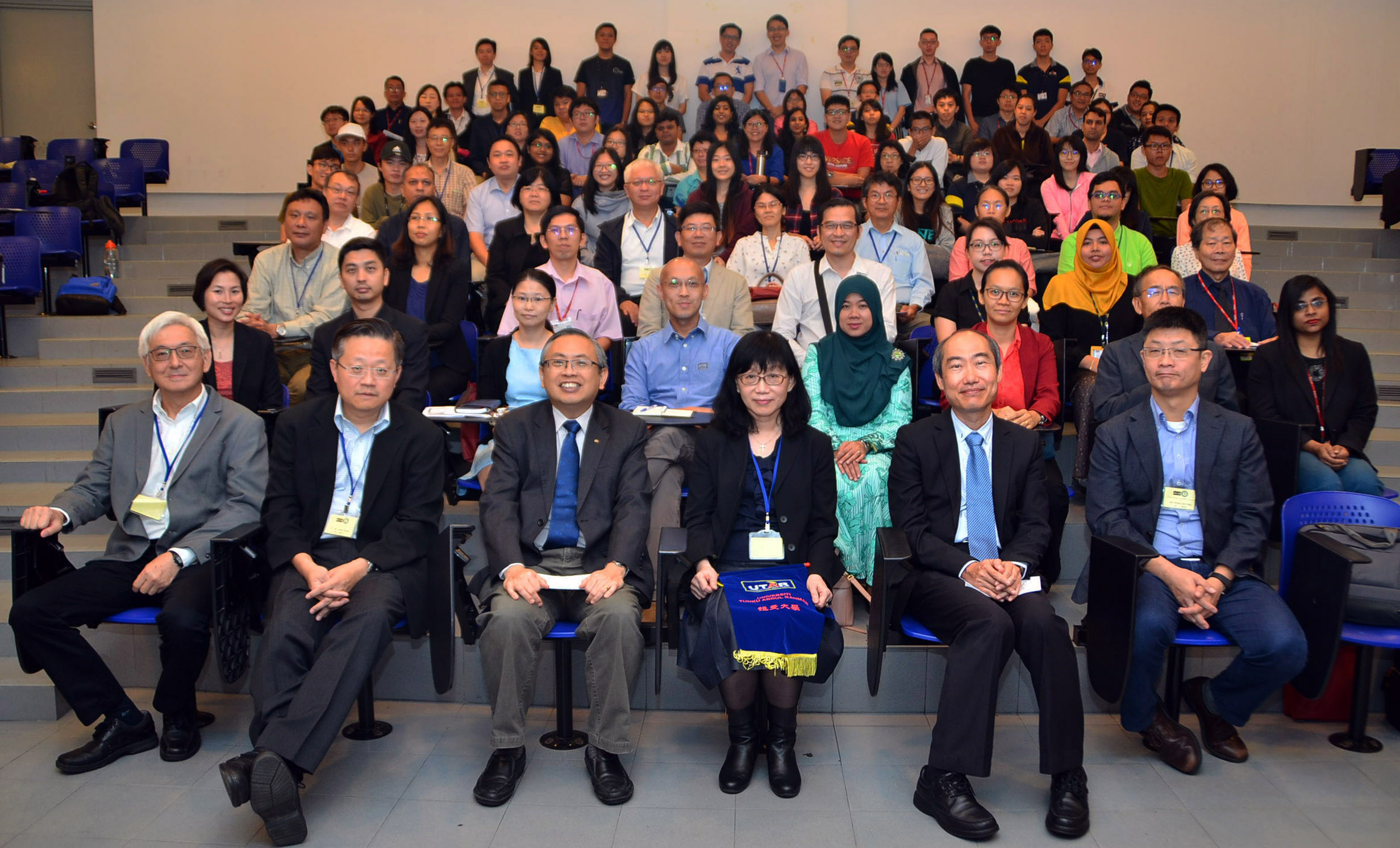
Third from left: Prof Ewe, Dr Chern, Dr Lim, researchers, academics and participants at Kampar Campus
An inaugural bilateral symposium between UTAR and Academia Sinica (AS), Taiwan, was held at Kampar Campus on 8 October and then at Sungai Long Campus on 10 October focusing on Physical Science, Life Science and Medical.
Jointly organised by the Faculty of Science (FSc) and AS, the symposium at Kampar Campus saw the coming together of over 20 prolific researchers from both Taiwan and Malaysia to share their insights and latest findings in the areas of Physical Science and Life Science.
Led by the Director and Distinguished Fellow of AS Dr Chern Yi-Juang, the AS delegation was welcomed by UTAR Vice President for Internationalisation and Academic Development Prof Ir Dr Ewe Hong Tat, FSc Dean Assoc Prof Dr Lim Tuck Meng and Division of Community and International Networking (DCInterNet) Deputy Director Dr Chen I-Chi.
Introducing UTAR as a fast-growing university, offering quality yet affordable education and encouraging R&D activities which will benefit the society, Prof Ewe mentioned the university is, therefore, more than honoured to be hosting the symposium so as to promote mutual learning and collaboration. Adding that UTAR has had strong and long-standing ties with over 50 universities in Taiwan, Prof Ewe said, “UTAR has been working hard in international collaborations. Such international collaboration will enhance staff and students’ international exposure and we believe that the research areas of science, technology and medicine are very important following the advent of the Fourth Industrial Revolution. Currently, UTAR has over 1,300 academics who are involved in R&D and we have 32 research centres covering the fields of engineering, information technology, science, medicine, business, finance, and arts and social science. To support the R&D initiatives, we also allocate annual internal research funding through the UTAR Research Fund (UTARRF) and also encourage academics to work with other researchers, like all of you from AS as well as from other institutions.”
Expressing her appreciation to UTAR for the warm hospitality, Dr Chern also extended her invitation to UTAR and the local researchers to visit AS. “AS was established in 1928 and is Taiwan’s highest academic research institution with the mission to enhance research capacities in the humanities and sciences. We also conduct, promote and facilitate scholarly research so as to cultivate outstanding academic talent,” she explained. Besides introducing AS’s diverse international community of over 770 international scholars, the Biomedical Science expert also presented the available AS research mobility programmes such as the Short-Term Visiting Programme from and to AS, Postdoctoral Fellowship Programmes, Taiwan International Graduate Programme (TIGP), joint PhD supervision programmes and TIGP Summer International Internship Programme.

Prof Ewe (left) and Dr Chern (right) both expressing keen interests for potential research collaborations between UTAR and AS

Prof Ewe and Dr Chern exchanging souvenirs
The symposium also saw Dr Chern delivering her keynote lecture titled “Adenosine Augmentation Evoked by an ENT1 Inhibitor Improves Memory Impairment and Neuronal Plasticity in a Mouse Model (APP/PS1) of Alzheimer’s Disease” before the parallel sessions on Physical Science and Life Science.
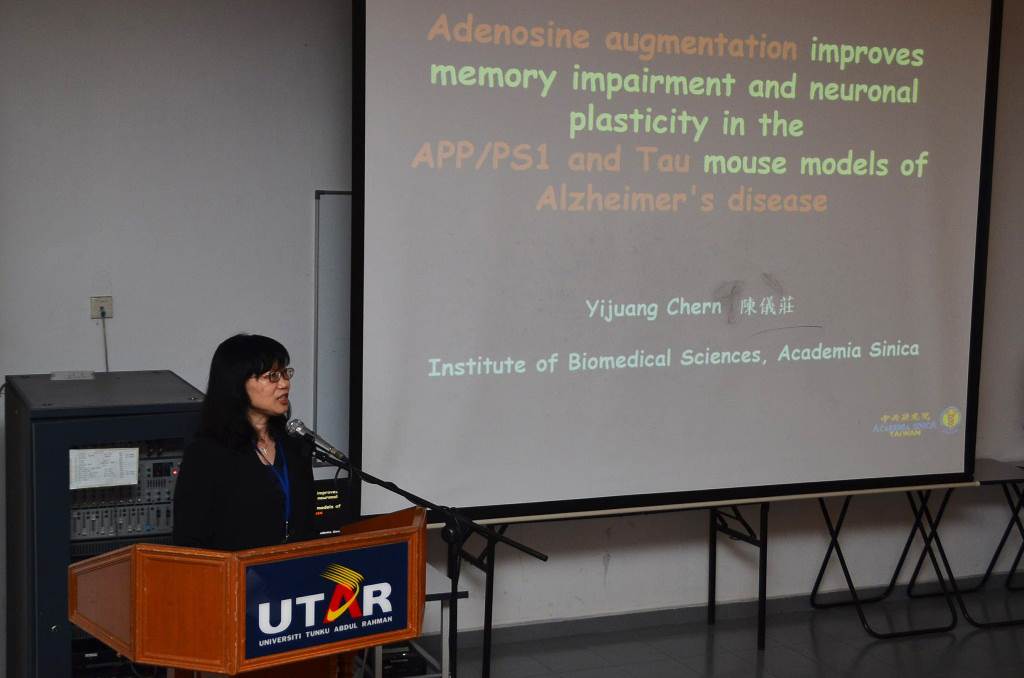
Dr Chern shedding light on her study which provides a potential therapeutic strategy to delay Alzheimer’s disease progression
Among the line-up of AS researchers who shared their rich breadth of expertise during the parallel sessions included the Institute of Chemistry’s Dr Ong Tiow Gan and Dr Chen Chin-Ti; Institute of Molecular Biology’s Dr Chang Wen and Dr Chien Cheng-Ting; Institute of Biomedical Sciences’ Dr Lin Jung-Hsin and Dr Chen Chien-Chang; Institute of Physics’ Dr Chen Chii-Dong, Institute of Biological Chemistry’s Dr Lin Chung-Hung, Institute of Plant and Microbial Biology’s Dr Ma Lay Sun, Institute of Information Science’s Dr Su Li, Institute of Cellular and Organismic Biology Dr Kuo Hung-Chih and Biodiversity Research Center’s Dr Chiu Chin-Yu.
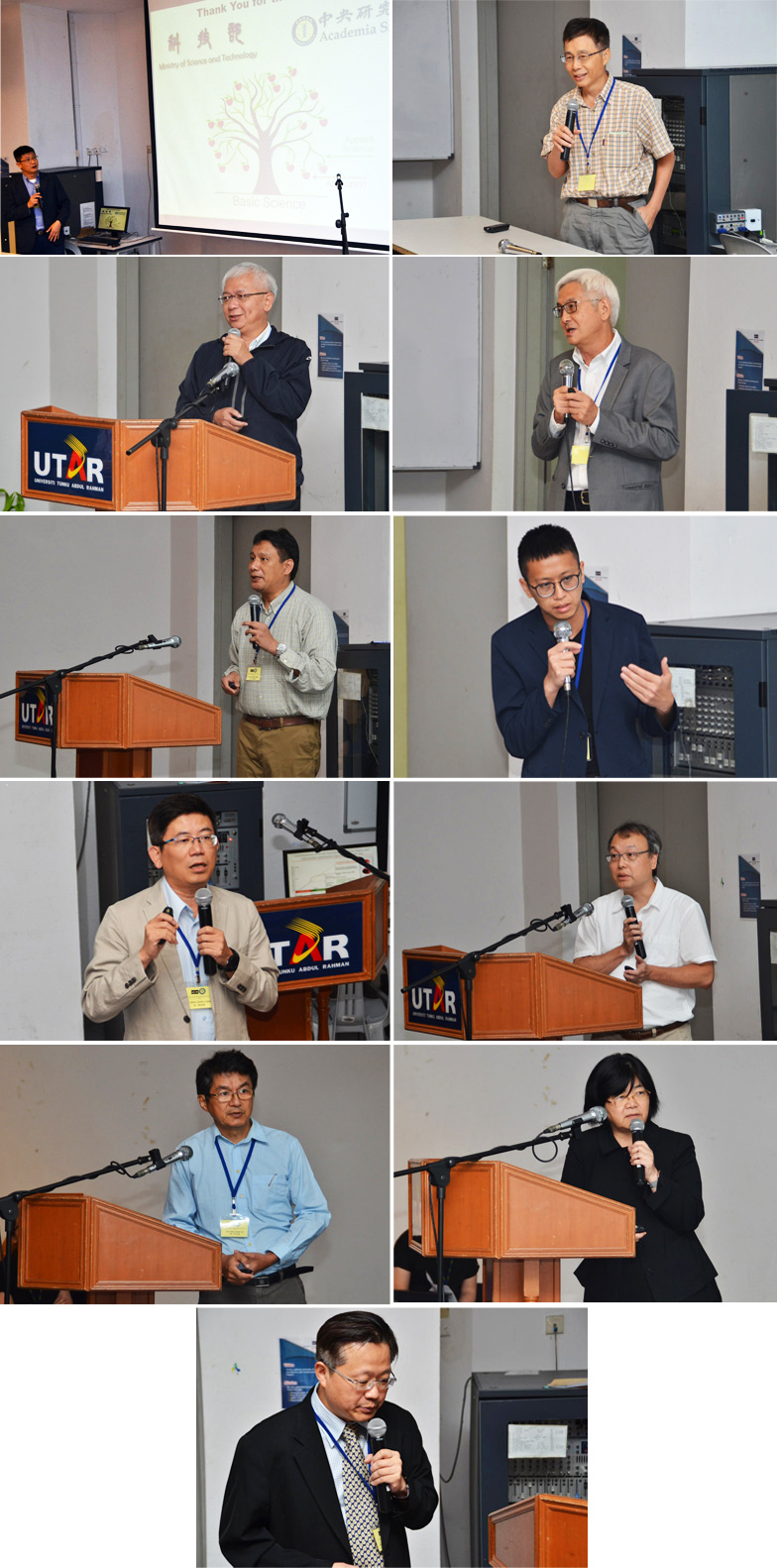
AS academics imparting their knowledge (clockwise from top left): Dr Ong, Dr Chen Chii-Dong, Dr Chen Chin-Ti, Dr Su, Dr Kuo, Dr Chang, Dr Lin Chun-Hung, Dr Chiu, Dr Chen Chien-Chang, Dr Lin Jung-Hsin and Dr Chien
The academics from local institutions of higher learning who also shared their research findings included UTAR’s Prof Dr Minoru Murata, Assoc Prof Dr Sim Yoke Leng, Assoc Prof Dr Wong Hann Ling, Dr Ng Soo Ai, Dr Mohammod Aminuzzaman, Dr Kuan Chee Hao and Dr Yap Moh Lan; Universiti Sains Malaysia’s Prof Dr Lim Jit Kang, Assoc Prof Dr Yeoh Fei Yee, Dr Lee Hooi Ling; Universiti Malaya’s Assoc Prof Dr Vannajan Sanghiran Lee and Universiti Kebangsaan Malaysia’s Prof Dr Norazlina Mohamed.
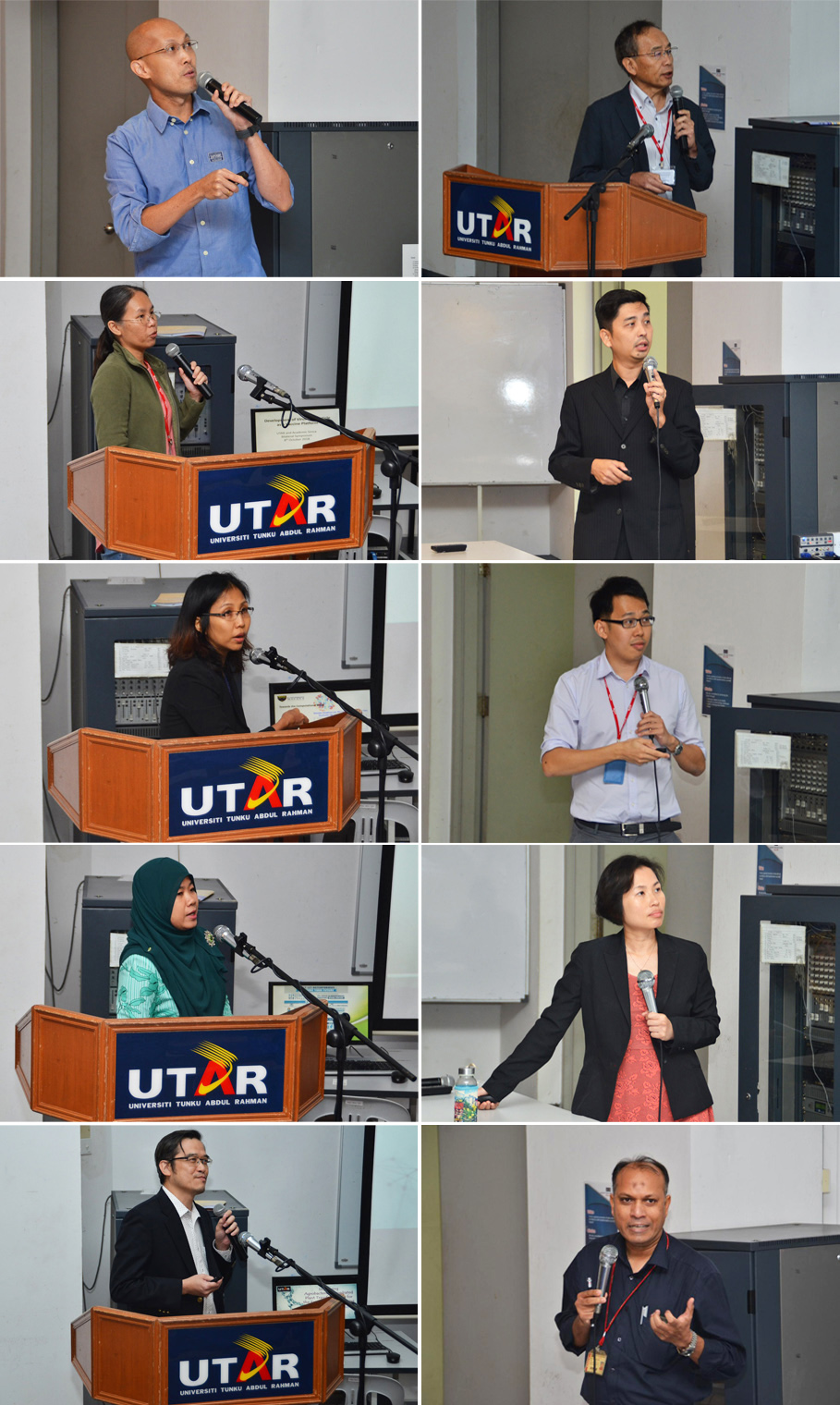
Academics of Malaysian universities presenting their findings (clockwise from top left): Prof Lim, Prof Murata, Dr Yeoh, Dr Kuan, Dr Lee, Dr Mohammod Aminuzzaman, Dr Wong, Prof Norazlina, Dr Vannajan and Dr Yap
Reminiscing the first encounter and engagement with AS early this year, Dr Lim in his closing remark thanked the relevant parties who have brought both UTAR and AS together which eventually brought about the symposium. “It is because of your effort and interest that this symposium is made possible. FSc plays just a small part in providing an avenue for different people to meet and know the interests as well as the works of others so that there will be better collaborations,” said Dr Lim, who also mentioned that UTAR welcomes any parties who would like to collaborate to help advance knowledge and technology for the benefit of all. “Hope that with whatever knowledge that we gain today, the good memory and new friendships made, we will take this back home and work together for a better future,” he concluded.
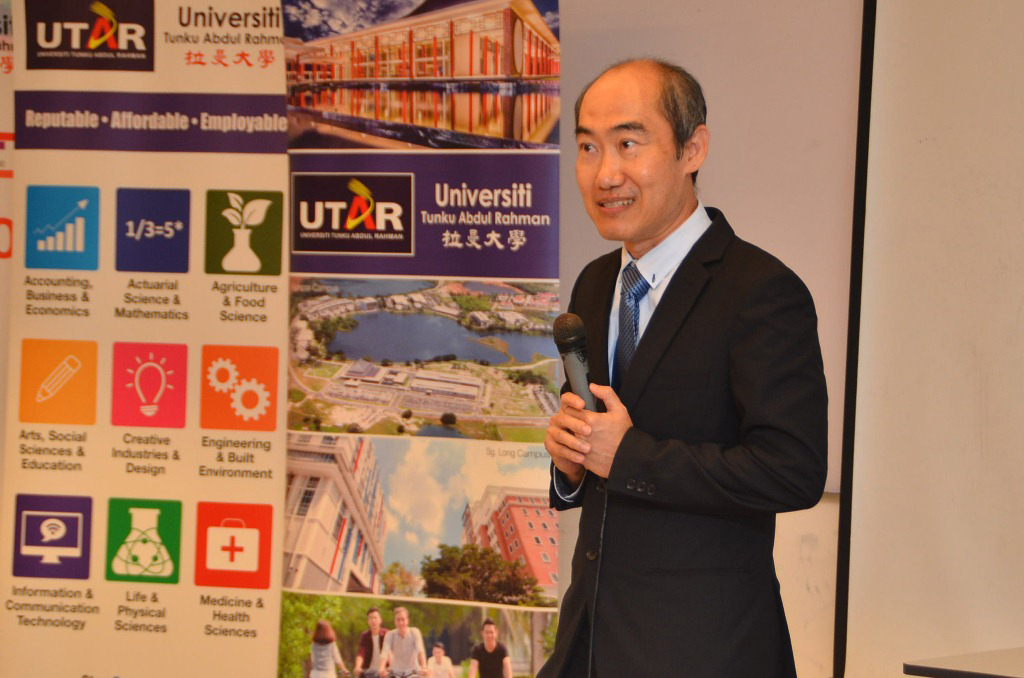
Dr Lim looking forward to various research collaborations with AS
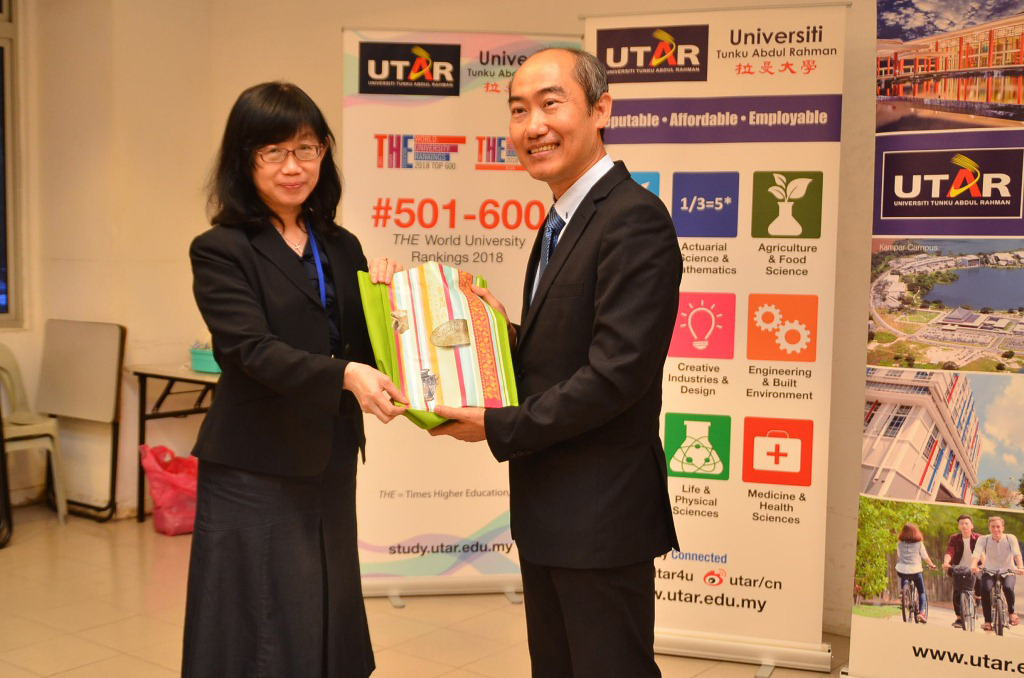
Dr Chern (left) presenting a souvenir to Dr Lim as a gesture of gratitude to FSc
The AS delegates were thereafter also invited to tour FSc’s laboratories.
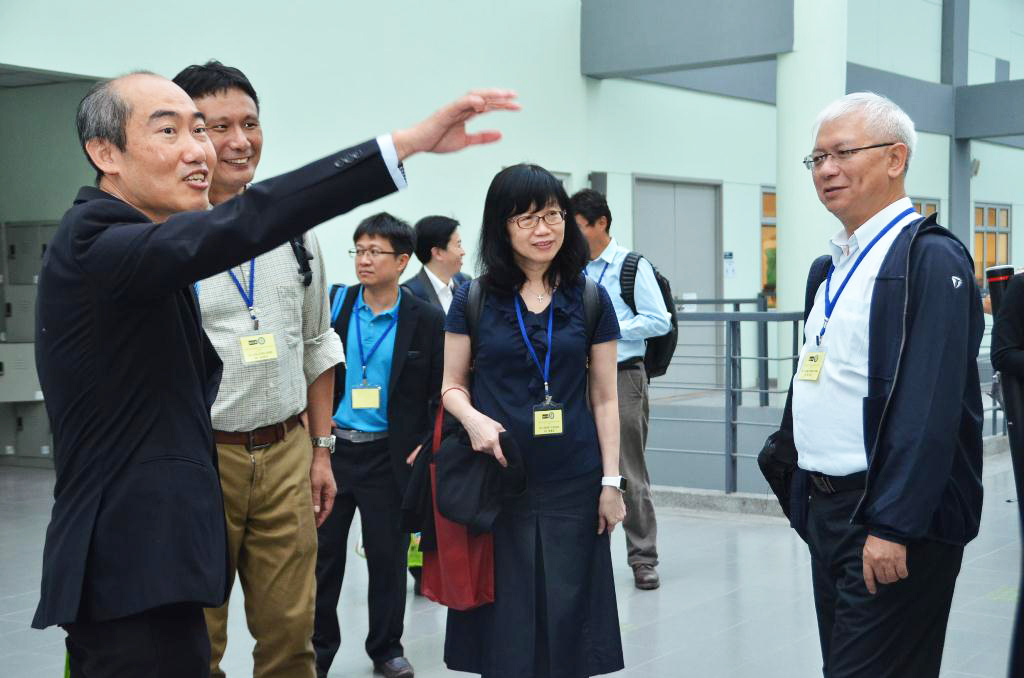
Dr Lim (left) introducing FSc, its laboratories and facilities to the AS delegates
The Medical-themed symposium was subsequently held at Sungai Long Campus on 10 October, where 12 researchers from both UTAR and AS presented their research papers covering a wide range of topics such as drug discovery, cardioprotection, extrachromosomal telomere DNA and alternative lengthening of telomeres cancer development, induced pluripotent and spheroidal stem cells. At the symposium, opening remarks were given from R&D and Postgraduate Programmes Deputy Dean Prof Dr Yap Sook Fan on behalf of FMHS Dean Emeritus Prof Dr Cheong Soon Keng and Dr Chern, with a brief introduction of the institute’s programmes and faculties respectively.
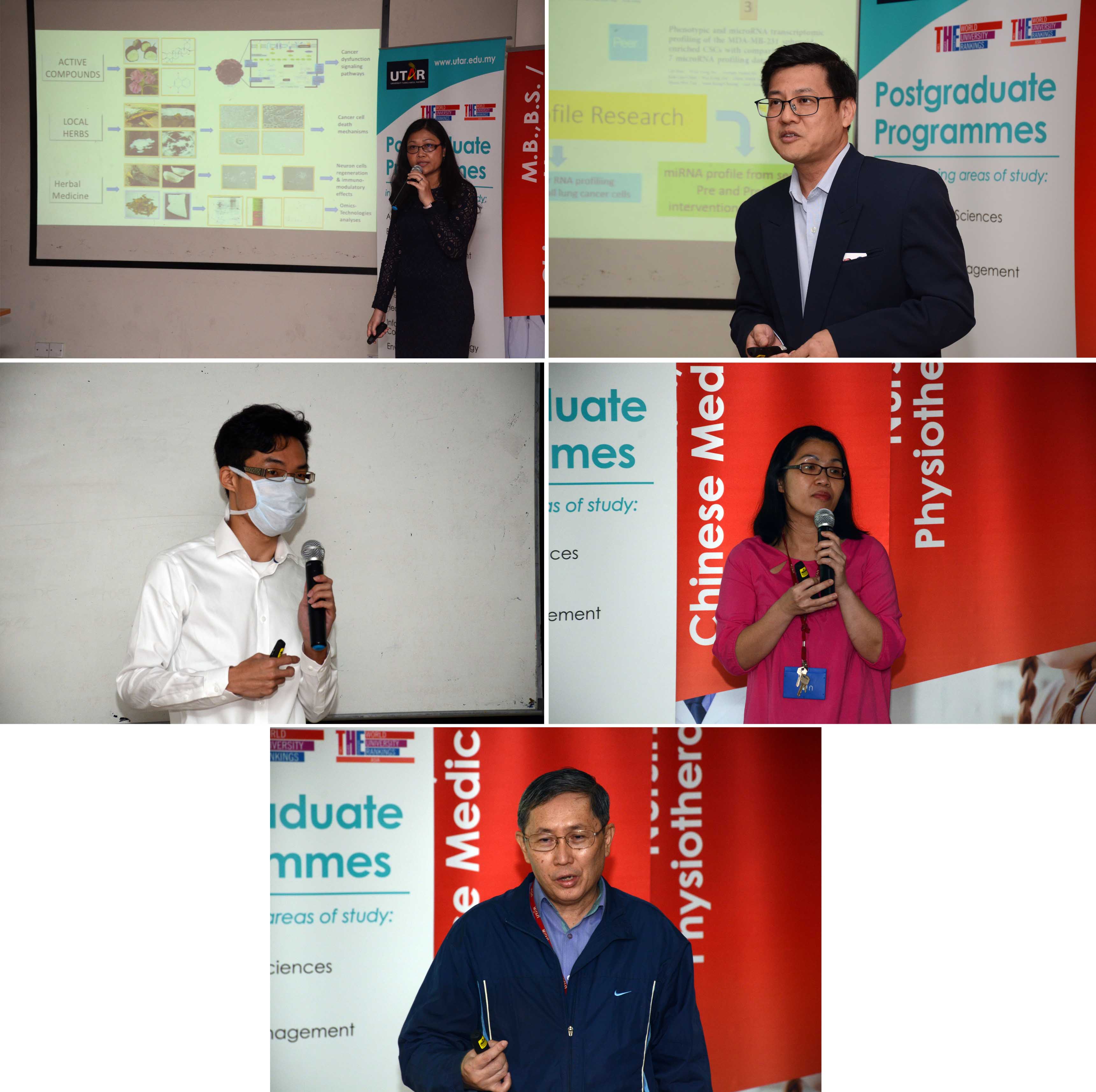
Academics from UTAR presenting their findings (clockwise from top left): Prof Lim, Prof Ong, Dr Leong, Prof Choo and Looi
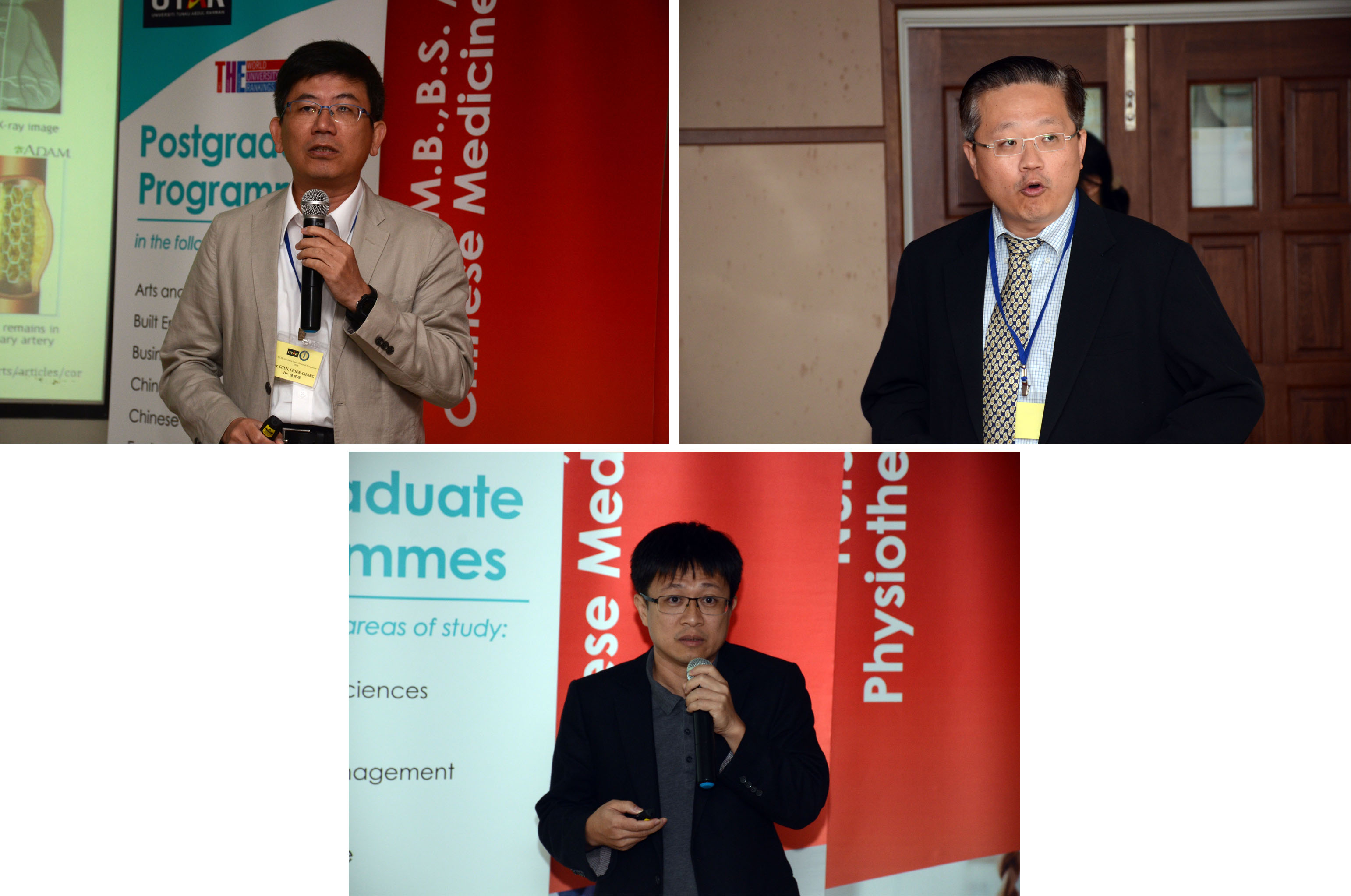
Academics from AS presenting their findings (clockwise from top left): Dr Chen, Dr Lin and Dr Chen
The symposium also saw a lively exchange of opinions and perspectives among researchers. UTAR Centre for Stem Cell Research Chairperson-cum-Student Development and Industrial Training Deputy Dean Prof Dr Alan Ong Han Kiat, Centre for Cancer Research Chairperson-cum-Postgraduate Programmes Head Prof Dr Lim Yang Mooi, Department of Pre-clinical Sciences Head Dr Leong Pooi Pooi, FMHS Academic Prof Dr Choo Kong Bung and doctoral student Looi Hong Keat were among those contributors to the sessions. While AS researchers were Dr Chern, Dr Kuo, Dr Chien, Institute of Biological Chemistry’s Dr Lin Chun-Hung, Institute of Molecular Biology’s Dr Chen Liuh-Yow, Institute of Biomedical Sciences’ Dr Lin Jung-Hsin and Dr Chen Chien-Chang.
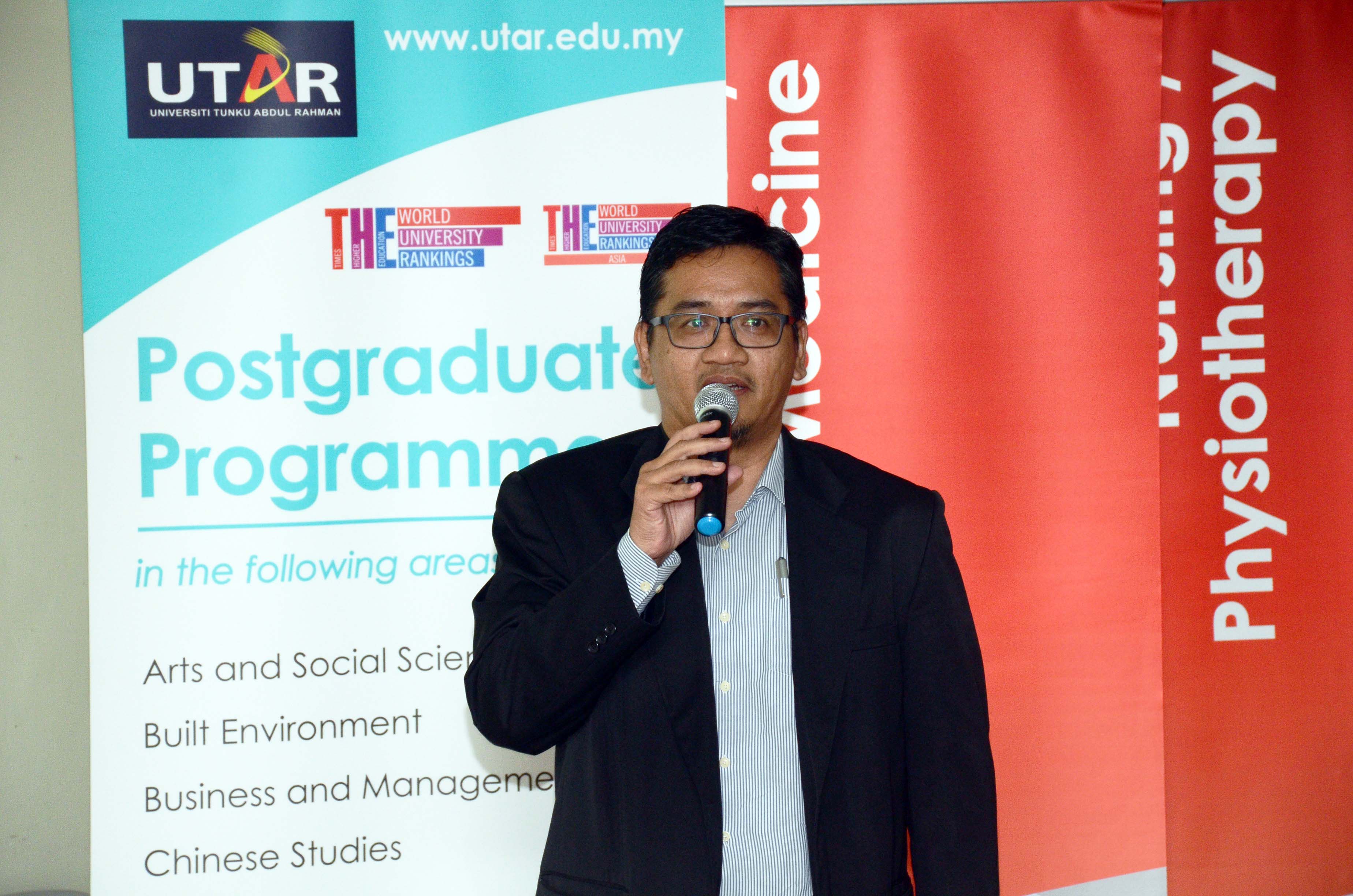
Prof Faidz thanking the presenters for showcasing various research works which greatly enriches the contents of the seminar
Giving his closing remarks at the symposium, UTAR Vice President for R&D and Commercialisation Prof Ts Dr Faidz bin Abd Rahman expressed his gratitude to the researchers for sharing their valuable research work at the symposium. He mentioned that the aim of the symposium was to provide the researchers with a platform for disseminating research findings, sharing contemporary knowledge and building networks and collaborations to advance research and thereby contribute to both institutes. He also expressed his hope that more research collaborations could be established at the inter-institutional and cross-country levels, and he is looking forward to have a productive and formal relationship between both institutions.
A meeting was subsequently held after the seminar, with the participation of delegates from both UTAR and AS. Headed by Prof Faidz and Dr Chern, both parties carried out a discussion on means of cooperation, in which they exchanged ideas and opinions as well as discussed the resources available at both institutions. Various issues and some possible collaborations were brought up at the meeting, including short-term visiting programme, TGIP summer international internship programme, short courses for UTAR undergraduate research scheme at AS, and joint supervision for postgraduate programmes. The meeting also included a discussion on the direction and the possibilities of the memorandum of understanding (MoU) between UTAR and AS with a view to formalising and strengthening the relationship between both institutions.
UTAR previously signed its first MoU with the Center for Asia-Pacific Area Studies (CAPAS) of AS in 2009. The MoU aimed to explore areas of potential collaboration which paved ways for scholarships, dissemination of knowledge to the Asia-Pacific region, and sharing of expertise. Under the same MoU, mutual visits by faculty members were also facilitated for the purpose of enhancing efforts in pursuing research, teaching and for them to participate in seminars, conferences, and workshops. Academic collaborations were also extended through the study visits and student exchanges of postgraduate and undergraduate students. UTAR has also been actively sending publications to AS in hopes of spurring potential researchers to collaborate with one another. Such collaborative ties with CAPAS AS were strengthened further in an MoU renewal in 2015.
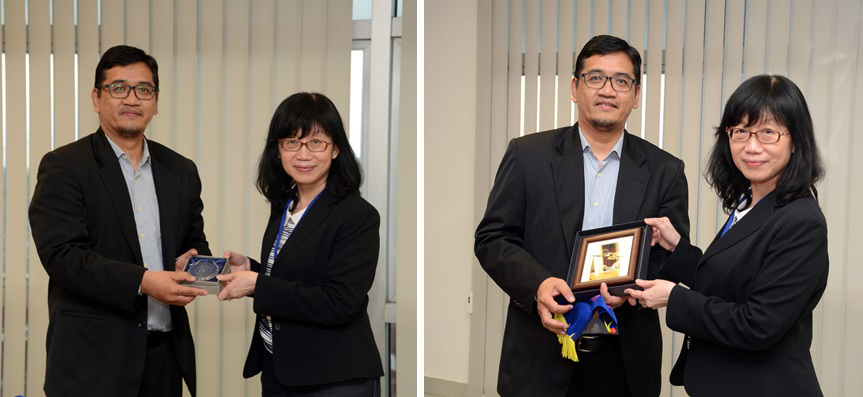
Souvenir exchange between Prof Faidz and Dr Chern (far right) after the meeting
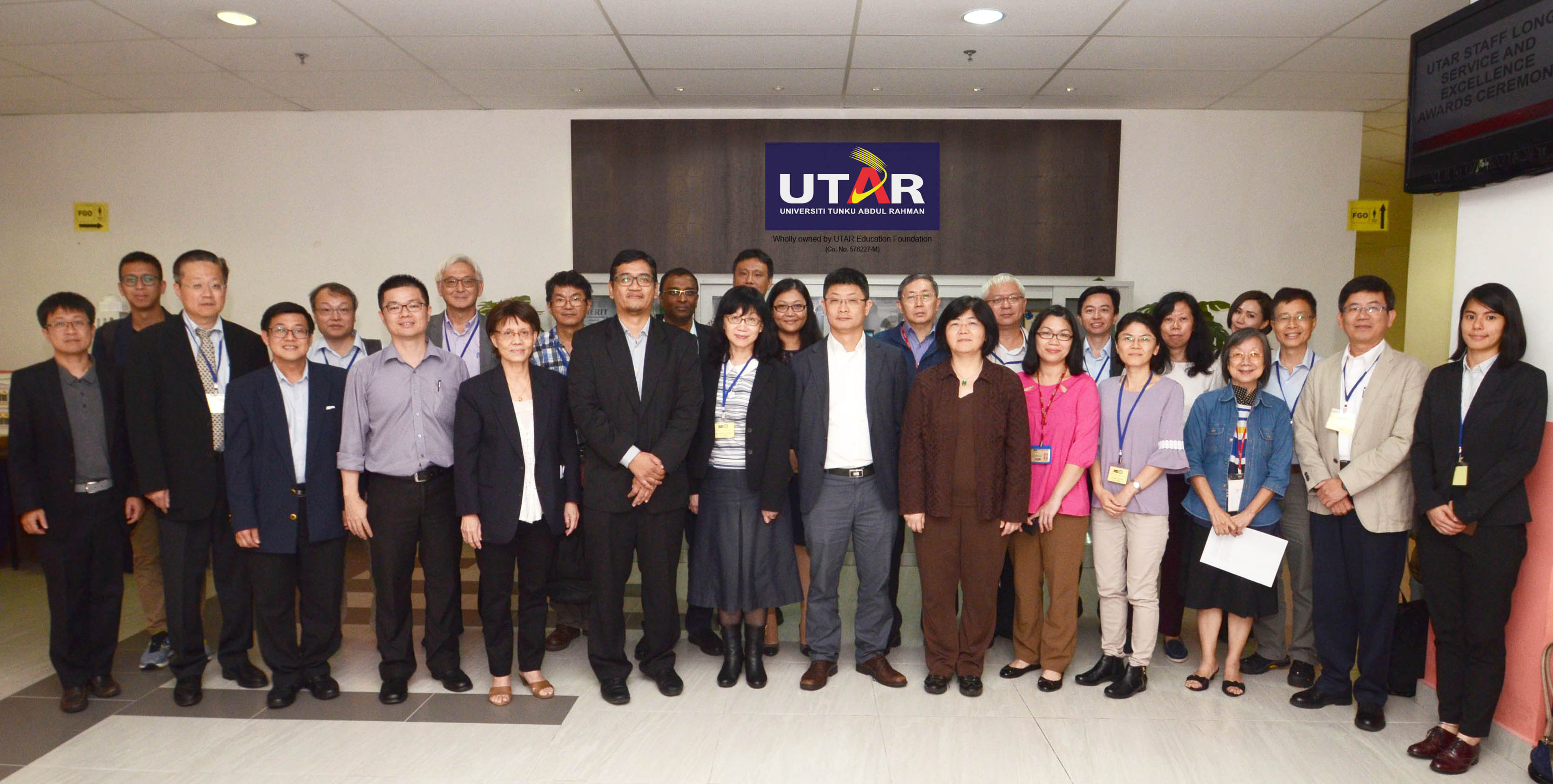
Prof Faidz (front row, sixth from left) and Dr Chern (seventh from left) with all the delegates
© 2019 UNIVERSITI TUNKU ABDUL RAHMAN DU012(A).
Wholly owned by UTAR Education Foundation Co. No. 578227-M LEGAL STATEMENT TERM OF USAGE PRIVACY NOTICE